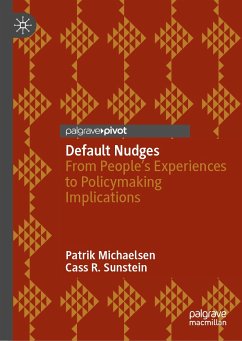Default rules are in widespread use, but we have very little information about how people experience them, whether they see themselves as manipulated by them, and whether they approve of them in practice. In this book, Patrik Michaelsen and Cass R. Sunstein offer a wealth of new evidence about people's experiences and perceptions with respect to default rules. They argue that this evidence can help us to answer important questions about the effectiveness and ethics of nudging.
The evidence offers a generally positive picture of how default nudges are perceived and experienced. The central conclusion is simple: empirical findings strongly support the conclusion that, taken as such, default nudges are both ethical and effective. These findings, and the accompanying discussion, have significant implications for policymakers in many nations, and also for the private sector.
Patrik Michaelsen is a Researcher at the University of Gothenburg, Sweden. He holds a Ph. D. in Psychology from the Department of Psychology, University of Gothenburg.
Cass R. Sunstein is the Robert Walmsley University Professor at Harvard University, USA. From 2009 to 2012, he was Administrator of the White House Office of Information and Regulatory Affairs, and since that time, he has held several positions in the U.S Government. From 2020 to 2022, he was the Chair of the Technical Advisory Group on Behavioral Insights and Sciences for Health at the World Health Organization. He is the founder and director of the Program on Behavioral Economics and Public Policy at Harvard Law School. Sunstein has written numerous books, including Human Agency and Behavioral Economics: Nudging Fast and Slow (Palgrave, 2017); Why Nudge?: The Politics of Libertarian Paternalism (2014); and Nudge: Improving Decisions About Health, Wealth, and Happiness (with Richard H. Thaler, 2008).
Dieser Download kann aus rechtlichen Gründen nur mit Rechnungsadresse in A, B, BG, CY, CZ, D, DK, EW, E, FIN, F, GR, HR, H, IRL, I, LT, L, LR, M, NL, PL, P, R, S, SLO, SK ausgeliefert werden.


